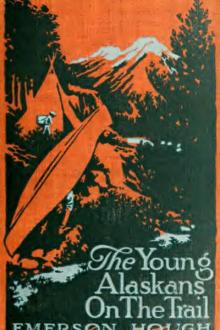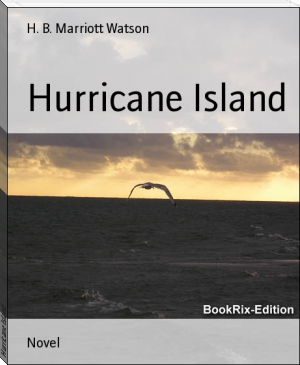The Young Alaskans by Emerson Hough (love books to read txt) 📕

- Author: Emerson Hough
- Performer: -
Book online «The Young Alaskans by Emerson Hough (love books to read txt) 📕». Author Emerson Hough
“We’ll make a hunt this afternoon,” said Rob, “and see whether we can find any gull eggs. First we want to see what our resources are, and after that we can help ourselves as need be.”
Accordingly, after they had taken the cargo out of the dory, and thus completed their labors for the time, they all four embarked in the dory, pushed rapidly down the creek, and out into the open waters of the bay. Here, a half-mile ahead of them, below the mouth of the creek, they saw some rough pinnacles of rock, over which soared thousands of sea-birds. As they approached these rocks they found a narrow beach wide enough to hold the dory. It took them but a few moments’ climb to gather all the eggs they wanted. These they were obliged to carry in their pockets or in the folds of their jackets. They trusted Jimmy to tell them which were fresh. Jimmy seemed always to know what ought to be done, and now without any advice he left the boys and proceeded to climb up to the steeper part of the rocks, where the nests of the gulls and sea-murres were so thick that he could scarcely avoid crushing the eggs as he walked. Evidently it was not eggs he sought. Agile as a cat, he climbed to the top of a sheer face of rock, and leaning over put his hand into a hole. A moment later the boys saw a dark body hurtle through the air and fall on the beach. It proved to be a stout, heavy, dark-colored bird with a strong, parrot-like beak and a crest of long yellow feathers on each side of the head.
“That’s a sea-parrot,” said Rob, picking it up. “Look out, Jesse, there comes another!”
Sure enough, one after another of the dead bodies of the sea-parrots fell on the narrow beach, until two or three dozen were lying there.
Jimmy ceased his labors, climbed down the rocks, and calmly began to skin off the breast plumage of the birds.
“What’s he doing that for?” asked Jesse of Rob.
“They’re not good to eat,” said Rob, “that’s one thing sure. I’ll tell you what—I’ve seen some dark-colored feather coats and blankets at the trader’s store down below Valdez. I’ll warrant they were made out of the breasts of these very sea-parrots here.”
Whatever were Jimmy’s plans he could not or did not disclose them. After a time he threw his heap of parrot-skins into the front of the dory, and stood waiting at the side of the boat, as though ready to go home if the others wished it. They therefore embarked for return to their camp.
XIII MAKING A LIVING“
If any of our people were along,” said John, as they headed the dory back toward the mouth of the creek, “I would say we could have a pretty good time here.”
“I don’t doubt,” answered Rob, “that we can get along all summer without trouble. I believe, too, that the natives come here so often we may be able to send out word even if we can’t get out ourselves. We can’t possibly be a hundred miles from Kadiak town, and although we might get there in our dory, the chances are so much against it that I think we would do better to stay right where we are for a time at least. As we were saying not long ago, this country furnishes a living without much trouble.”
“And without much work,” added John, “as long as we have Jimmy.”
“He’s stronger than we are,” admitted Rob; “still, each of us must do his share of the work around camp, because that’s the only right way to do. He’s a good teacher, for we’re in his country and will have to live in his way—What’s on his mind now, do you suppose?” Rob continued, as Jimmy suddenly stopped rowing and began to look keenly off toward shore.
“I see him!” exclaimed Jesse, eagerly. “It’s a seal! Look at him!”
About sixty yards away there was a round object with two shining spots on it standing just above the water—the head of a seal which was closely examining the strange object which approached it. All at once, as they looked at it, the seal suddenly sank out of sight. Without instruction the Aleut now bent to his oars as hard as he could, and hurried to the beach which lay not far beyond. Hurriedly pulling the dory up, he motioned to Rob to get out with his rifle.
“There he is again!” called John, pointing. “He’s closer in now. Look, he isn’t a hundred yards away! You try him, Rob; you’re the best shot.”
Crouching down, Rob hurried toward a big rock which lay at the water’s edge. Here he rested his rifle and, taking quick aim, fired. The splash of the ball on top of the intervening wave showed that he had missed. Once more the seal sank, but in the course of a few minutes it appeared yet again, this time still closer in. Carefully Rob fired a second time, and this time they all heard distinctly the thud of the bullet, which proved that the shot had struck true. With a splash the seal disappeared, but giving a shout the Aleut pushed off the dory and called to them all to get in. In a few moments he brought them alongside the still struggling body of the seal, which appeared now above and now beneath the surface of the water. Hurriedly catching up his long spear, the native made a thrust at the seal and fastened it with the barb, and with many grunting chuckles drew it alongside. Soon, with a heave, he got it inboard—a small hair seal not much more than three feet in length.
“Karosha!” exclaimed the Aleut, with a grin.
“He means that it’s good—that it’s all right,” explained John, who seemed to be the official interpreter.
“Well, I don’t believe that I care to eat seal meat,” said Rob; “but maybe Jimmy knows what he can do with the hide, or something else. We’ll skin Mr. Seal and peg his hide out up at the camp. It’s time now we got the bear hides stretched so that they can begin to dry.”
Much elated with their successful day’s work, the boys now assisted the native in stretching all the green hides, flesh side upward. The native showed them how to flesh and scrape the hides, and they spent an hour or so at this until each complained that his back was aching.
“Suppose we cross the creek and take a little climb up the mountain-side,” suggested Rob. “We can get a good look out from there.”
“All right,” said John. “Of course we’ll have to take our tillicum along. Mush on, Jimmy!”
The Aleut, although apparently a native of the country where the language of the dog-train was little known, nevertheless seemed to understand the Alaskan command to “March!” He stood ready, only looking to see which way they wished him to go. Rob set off in advance, and they all splashed through the waters of the shallows at the lower end of the lagoon.
“Here’s where Jimmy has a good deal the best of us,” said Rob, pointing to their wet feet. “Our shoes will be gone in a little while; but look at his seal boots with high tops. They keep his feet dry.”
“They call them tabosas,” said John. “The Eskimos use boots like that, but they call them mukluks. You see, I used to know a native from up-coast who was a waiter in a restaurant at Valdez. That’s how I picked up my knowledge of the Aleut language—which, you see, is quite considerable,” he concluded, swelling out his chest a trifle.
“I see now why he wanted that seal,” commented Rob. “Every country has its own way of getting along, hasn’t it? Now, I suppose Jimmy here is about as comfortable when he is at home as we are in our houses down in Valdez; and he certainly does know how to make his living off the country.”
They now continued their slow climb up the steep mountain-side, which lay beyond the little creek. Here the deep moss or tundra extended quite to the top of the smallest peak, but although heavy snow-fields lay at the top, the spring sunshine had now melted the snow at the lower levels, so that continually they were walking in little pools of ice-water, none too pleasant to persons shod as they were.
Jesse, the youngest of the party, now and then stopped for a moment to catch his breath; and, in fact, he seemed none too happy with some of these hardships of their experience.
“Come on,” said Rob; “we’ll stop when we get to the thicket just up above there. Jimmy acts as though he was looking for something up there—I don’t know what.”
They toiled on upward, now and again turning to look at the great expanse of country which lay below them—the wide bay shining in the sunlight, the magnificent panorama of the mountains beyond, and the line of the deep sea beyond the entrance to the bay. They turned as they heard a sudden exclamation from Jimmy, who was prowling at the edge of the alder thicket where they had stopped for the moment. As he pointed down they saw the surface of the ground among the alders ripped up as though by a giant plough.
Jimmy held up three fingers and pointed below toward their camp, the smoke of whose fire they could dimly see. At first they could not understand him, until he made motions as if digging, and swung his head from side to side, grunting in such plain imitation of a bear that they could not mistake. Then they saw that this had probably been the feeding-ground of the three bears which they had killed. Apparently the bears had been living high up in the mountains for a long time, waiting for the salmon run to begin. The country was all torn up where they had dug for roots and bulbs.
“Well, now, what’s Jimmy going to do this time?” asked Jesse, interested.
The Aleut, talking to himself in some unknown words, was down on his hands and knees, himself digging in the holes among the alders.
“Karosha!” said he, at length, holding up several long, white bulbs about as thick as his finger; and he made a motion as though to eat them.
“Ah, ha!” said Rob. “This is an Aleut potato-patch, it seems. All right, we’ll just gather some of these and use them for vegetables. They’ll help out the meat and fish, perhaps.”
As Jimmy dug the bulbs they put them into the folds of their jackets and sweaters until they had a good supply. After this they made their way down the mountain, splashed through the creek again, and threw down their new discoveries beside the meat scaffold. Jimmy indulged in a broad smile.
“Plenty soup!” said he, suddenly.
“The beggar!” said Rob. “I shouldn’t wonder if he understood English as well as we do!”
They could not, however, induce him to use any further words than this, which is common among the Aleuts as the meaning of “food” or “plenty to eat,” they having got this word from their association with English-speaking persons. The Aleut language now is a mongrel, made up largely of Russian, with many native words and a few of English.
Jimmy proceeded to show that he meant to





Comments (0)